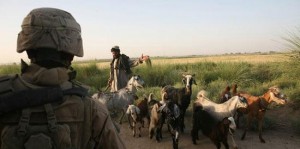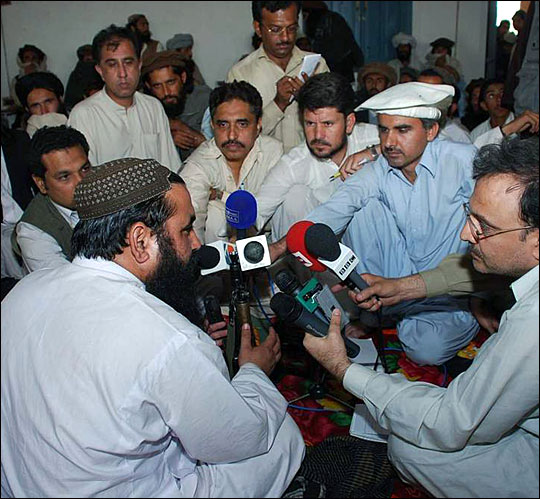For two years British troops staked out a presence in this small district center in southern Afghanistan and fended off attacks from the Taliban. The constant firefights left it a ghost town, its bazaar broken and empty but for one baker, its houses and orchards reduced to rubble and weeds.
But it took the U.S. Marines, specifically the 24th Marine Expeditionary Unit, about 96 hours to clear out the Taliban in a fierce battle in the past month and push them back 10 kilometers, or six miles …
The marines’ drive against the Taliban in this large farming region is certainly not finished, and the Taliban have often been pushed out of areas in Afghanistan only to return in force. But for the British forces and for Afghan residents, the result of the recent operation has been palpable …
Major Neil Den-McKay, the officer commanding a company of the Royal Regiment of Scotland based here, said of the U.S. Marine’s assault: “They have disrupted the Taliban’s freedom of movement and pushed them south, and that has created the grounds for us to develop the hospital and set the conditions for the government to come back.” People have started coming back to villages north of the town, he added, saying, “There has been huge optimism from the people.”
For the marines, it was a chance to hit the enemy with the full panoply of their firepower in places where they were confident there were few civilians. The Taliban put up a tenacious fight, rushing in reinforcements in cars and vans from the south and returning again and again to the attack. But they were beaten back in four days by three companies of marines, two of which were dropped in by helicopter to the south east …
Marines from Charlie Company said the reaction from the returning population, mostly farmers, has been favorable. “Everyone says they don’t like the Taliban,” said Captain John Moder, 34, commander of Charlie Company. People had complained that the Taliban stole food, clothes and vehicles from them, he said …
The U.S. commander of NATO forces in Afghanistan, General Dan McNeill, had a checklist of tasks around the country for the 3,200 marines when they arrived in March. But the majority of them have spent a month in Garmser after changing their original plan to secure a single road here, when they realized how important the area was to the Taliban as an infiltration and supply route to fighters in northern Helmand Province.
“This is an artery and we did not realize that when we squeezed that artery, it would have such an effect,” said First Lieutenant Mark Matzke, the executive officer of Charlie Company.
The whole area was unexpectedly welcoming to the U.S. forces, and eager for security and development, Moder of Charlie Company said.
“Us pushing the Taliban out allows the Afghan National Army to come in,” he said. “This is a real bread basket here. There’s a lot of potential here.”
This southern part of Helmand Province, along the Helmand River valley, is prime agricultural land and still benefits from the grand irrigation plan started by U.S. government assistance in the 1950s and 1960s. It has traditionally been the main producer of wheat and other crops for the country, but in 30 years of war has given way to poppies, providing a large percentage of the crop that has made Afghanistan the producer of 98 percent of the world’s opium.
The region has long been an infiltration route for insurgents coming across the southern border with Pakistan, crossing the border from Baluchistan via an Afghan refugee camp, known as Girdi Jungle, notorious for its drug smuggling and gun running.
The Taliban, and the drug runners, then race across a region known ominously as the desert of death until they reach the river valley, which provides ideal cover of villages and greenery.
With such a large area under their control, they were able to gather in numbers, stockpile weapons and provide a logistics route to send fighters and weapons into northern Helmand and the provinces of Kandahar and Uruzgan beyond.
The Taliban, who kicked out villagers and took over their farmhouses, sometimes even bringing their families from Pakistan to join them, were joined by Arabs and Pakistanis, Den-McKay said.
“The majority of elements in this area are Arab and Pakistani, and the locals detest them,” he said. Some of the Arabs were specialist trainers and some young jihadists from different countries. The commanders were Iranians, which shares a border with Afghanistan to the southwest, as well as Saudis and Pakistanis, he asserted …
The local people complained that the Taliban taxed them heavily on the opium harvest. They demanded up to 13 kilos of opium from every farmer, which was more than the entire harvest of some, so they were forced to go and buy opium to meet the demand, said one farmer Abdul Taher, 45.
“We had a lot of trouble these last two years,” said Sher Ahmad, 32.
His father, Abdul Nabi, the elder of a small hamlet in the village of Hazarjoft, a few miles south of Garmser, said: “We are very grateful for the security. We don’t need your help, just security.”
Villagers were refusing foreign aid because the Taliban were already infiltrating back and threatening anyone who took it, said Matzke, the first lieutenant of Charlie Company …
But the bigger test will come in the next few weeks as the marines move on, the Afghans take over, supported by the British, and the Taliban try to blend in with the returning population and orchestrate attacks, as everyone here expects them to do.
Take particular note of the words of town elder Abdul Nabi: “We are grateful for the security. We don’t need your help, just security.” Similar words were spoken at a meeting in Ghazni with the U.S. Ambassador to Afghanistan: ““We don’t want food, we don’t want schools, we want security!” said one woman council member.”
The narrative emerging is not one of largesse, roads, education, crop rotation, irrigation and all of the other elements of the soft side of counterinsurgency. To be sure, these elements are necessary and good, but sequentially they come after security.
But the Marines are leaving to pursue the wish list of accomplishments while in Afghanistan. Garmser, it is already known, will see the Taliban again. Why the British believe that without the Marines they can hold the terrain is not clear. Without the continuation of force projection there is no difference between the campaign now and two months ago. Effecting the conditions for security doesn’t happen instantaneously.
Whack-a-mole counterinsurgency was fought in Iraq prior to the surge, and much of it unsucessfully. Will the same mistake be repeated in Afghanistan?







